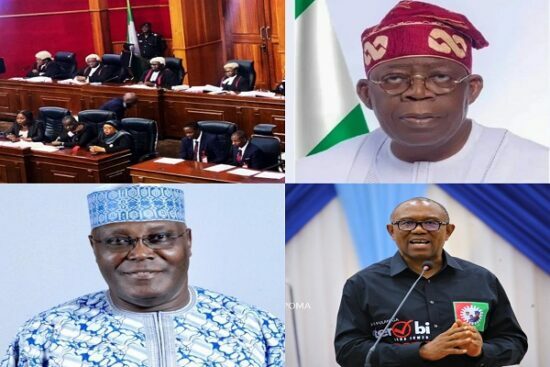…As Vice President Kashim Shettima, state governors, minister witnessed judgement
The Presidential Election Petition Court ( PEPC) sitting in Abuja, on Wednesday held that the petition filed by Peter Obi and the Labour Party (LP) against the election of Bola Ahmed Tinubu at the February 25 presidential election was un-meritorious.

Delivering judgement in the petition marked CA/PEPC/03/2023, the presiding Justice of the five-member panel of Justices of the court, Justice Haruna Tsammani, said the petitioners failed to prove their allegations in their petition as required by law and consequently dismissed the petition of the LP and its presidential candidate.
Justice Haruna Tsammani led the panel on the petition challenging the election of President Bola Ahmed Tinubu. It also held that the presidential candidates of the Labour Party, Mr Peter Obi and his Party, failed to substantiate fraud and drug allegations levelled against the President.
The court held that Tinubu was qualified to contest the February 25 presidential election.
Amongst grounds upon which Obi and LP are seeking the nullification of Tinubu’s emergence as president are that under a forfeiture order against Tinubu by a United States District Court, Tinubu stands disqualified from participating in the presidential election.

During the hearing of their petitioners claimed that Tinubu was made to forfeit the sum of $460,000 to the US over alleged complicity in drug-related offences.
But delivering judgment, the five-member panel stated that the petitioners failed to prove that Tinubu was found guilty of any offence involving any act of dishonesty, adding that evidence before the court showed that the forfeiture order against Tinubu was in a civil and not criminal matter.
Justice Tsammani agreed with the respondents that Tinubu was neither arraigned nor convicted in the US over any alleged crime to warrant disqualification.
Besides, the court pointed out that documents tendered by the respondents confirmed that Tinubu was given a clean bill of health upon an enquiry from Nigeria.
Further faulting the petitioners’ case, the court held that Section 269(1&2), provides that such documents must be given under the hand of a Police officer and accompanied with a certificate showing that the police officer has powers to sign such documents.
Also, the court pointed out that even if Tinubu were convicted for the alleged offence, for him to be disqualified from the 2023 election, the purported conviction must occur within 10 years of the election.
Meanwhile, the court has also dismissed the claim by Obi and LP that the election that produced Tinubu did not comply with the Electoral Act, 2022 because the results of the election were not transmitted in real-time to the INEC’s Results Viewing (IReV) portals.
According to the judgment, nowhere in the Electoral Act says election must be electronically transmitted for collation.
While pointing out that Sections 14 and 18 of the Electoral Act provide for the use of the Bi-modal Verification Accreditation System (BVAS) for the accreditation of voters, Justice Tsammani emphasized that electronic transmission of results is not expressly stated in the Electoral Act, but was only mentioned by INEC in its guidelines for the conduct of the election.
The court also held that the petitioners’ submission that a candidate must score 25 per cent of votes cast in the Federal Capital Territory, Abuja, to be validly declared the winner of a presidential election was, “Completely falacious”.
Justice Tsammani, who read the unanimous judgement, said the preamble to the 1999 Federal Republic of Nigeria constitution stipulates equality for all the country’s citizens.
The court said the FCT is not more than any state of the Federation as it has the same status as every other state.
On the issue of noncompliance with the Electoral Act in the conduct of the presidential election, the court held that the Independent National Electoral Commission (INEC) is at liberty to decide on the manner in which election results can be transmitted.
The presiding Justice further held that the electoral body cannot be compelled to transmit election results electronically, as held in a judgement by a Federal High Court sitting in Abuja, which has not been appealed against.
“INEC is a creation of the constitution and has the right to issue guidelines for the conduct of an election. The Electoral Act 2022 did not categorically state that election results must be transmitted electronically”, Justice Tsammani held.
The court also held that, out of the 13 witnesses called by the petitioners, only three had their statement on oath filed along with the joint petition of the LP and its presidential candidate as required by the Electoral Act.
He said the petitioners did not plead any evidence to substantiate the allegation of non-compliance to the Electoral law during the February 25 presidential election and added, “They failed to prove beyond reasonable doubt, the allegation of corrupt practices alleged in their petition”.
Vice President Kashim Shettima, the National Security Adviser (NSA), Nuhu Ribadu, Bauchi state governor, Bala Mohammed, Nasarawa state governor, Abdullahi Sule, Yobe state governor, Mai Mala Buni, Ekiti state governor, Biodun Oyebanji and the chairman of the All Progressives Congress (APC), Abdullahi Ganduje are among those that witnessed the verdict of the court.
Others who also witnessed the judgement are Minister of Aviation, Festus Keyamo (SAN); Imo state governor, Hope Uzodima; his Kogi State counterpart, Yahaya Bello; Minister of State for Defense, Bello Matawale; the Labour Party national chairman, Julius Abure. Lawyers, nollywood actors and supporters of the the Labour Party.
READ ALSO FROM NIGERIAN TRIBUNE







